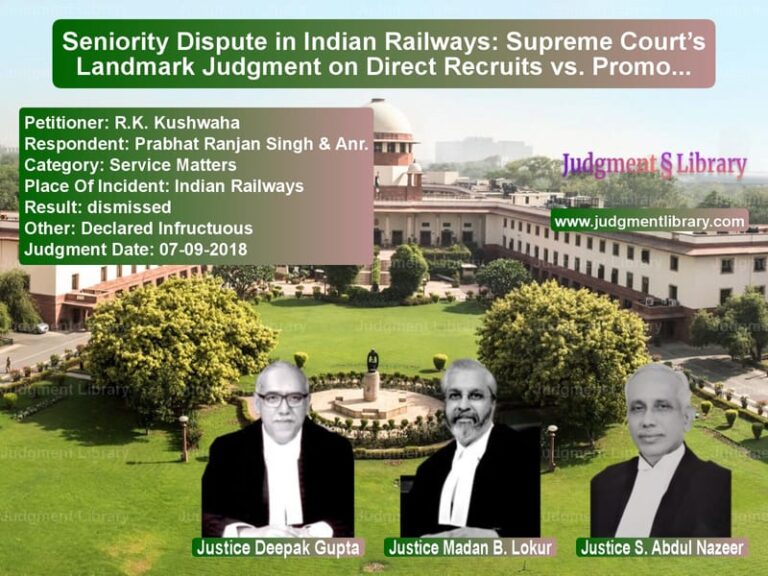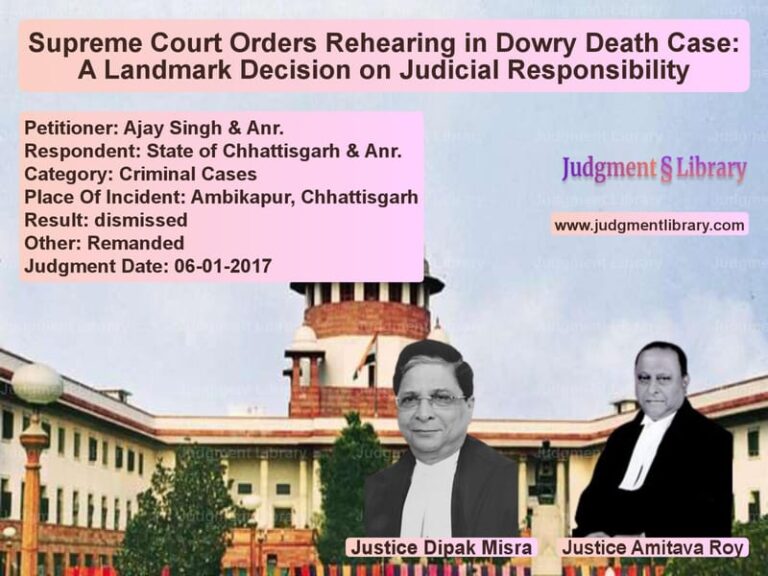Motor Accident Compensation: Supreme Court Revises Dependency Benefits and Insurance Liability
The case of National Insurance Company Limited vs. Birender and Ors. deals with a tragic motor accident and the legal battle surrounding the compensation claim by the deceased’s legal heirs. The Supreme Court examined the scope of dependency benefits for major, earning legal heirs and whether financial assistance received under government schemes should impact the compensation awarded under the Motor Vehicles Act, 1988.
The deceased, Smt. Sunheri Devi, was a government employee who died in an accident while traveling as a pillion rider on a motorcycle. The legal heirs filed a claim against the driver, owner, and insurer of the offending vehicle. The Motor Accidents Claims Tribunal (MACT) awarded compensation, which was later modified by the High Court. However, the insurance company challenged the award, arguing that major, earning children of the deceased could not claim dependency benefits. The Supreme Court’s decision clarified significant legal questions regarding the compensation framework for motor accident claims.
Background of the Case
On October 20, 2014, Smt. Sunheri Devi, employed as a Peon at the Tehsildar’s office, was riding pillion on a motorcycle when a dumper/tipper vehicle, allegedly driven rashly and negligently, collided with the motorcycle. She suffered fatal injuries and succumbed to them on the spot.
Her two adult sons, Birender and another claimant, filed a claim petition under the Motor Vehicles Act, seeking compensation of Rs. 50 lakhs. They contended that their mother was earning Rs. 23,123 per month and was the sole breadwinner. Despite being major and earning individuals, they claimed they were financially dependent on their mother.
Petitioner’s Arguments
The National Insurance Company, representing the insurer of the offending vehicle, challenged the claim on multiple grounds:
- The accident was not caused by the insured vehicle: The insurance company argued that the claimants failed to establish that the dumper vehicle was involved in the accident or that its driver was responsible for the collision.
- The claimants were not financially dependent on the deceased: Since the claimants were major, married, and earning individuals, they were not eligible for dependency benefits under the Motor Vehicles Act.
- The claimants received financial assistance under government schemes: The deceased was a government employee, and her legal heirs were entitled to financial benefits under the Haryana Compassionate Assistance to the Dependants of Deceased Government Employees Rules, 2006 (the ‘2006 Rules’). The insurer argued that this assistance should be deducted from the final compensation.
Respondent’s Arguments
The claimants countered the insurance company’s objections, stating:
- Major children can claim compensation under the Motor Vehicles Act: The law does not restrict compensation to minor dependents. Legal representatives of the deceased have a right to claim under Section 166 of the Act, irrespective of their financial dependency.
- The deduction of financial assistance should be limited: The High Court had deducted 50% of the financial assistance from the compensation, but the claimants argued that only one-third should be deducted.
- The deceased’s family pension should be included: The deceased was receiving a family pension, which should be considered part of the lost income when computing the compensation.
Findings of the Tribunal and the High Court
The Motor Accidents Claims Tribunal (MACT) found that the accident was caused by the negligent driving of the dumper vehicle. The Tribunal awarded compensation of Rs. 17,40,532, including Rs. 17,15,532 for loss of dependency and Rs. 25,000 for funeral expenses.
The High Court modified the Tribunal’s award as follows:
- Increased the compensation to Rs. 29,20,672 by considering future prospects.
- Deducted 50% of the financial assistance the claimants received under the 2006 Rules.
- Allowed the insurance company to recover any excess payment made to the claimants.
Supreme Court’s Analysis
The Supreme Court considered three key issues:
1. Eligibility of Major, Earning Legal Heirs for Dependency Compensation
The Court ruled that major children are legal representatives under Section 166 of the Motor Vehicles Act and can claim compensation. It emphasized:
“The legal representatives of the deceased have a right to apply for compensation irrespective of whether they were fully dependent on the deceased or not.”
2. Deduction of Financial Assistance from Compensation
The Court ruled that financial assistance under the 2006 Rules should be deducted from the compensation to prevent double benefits. However, it clarified that only financial assistance equivalent to the deceased’s salary should be deducted, and family pension should remain untouched.
“If financial assistance has been received under the 2006 Rules, it should be deducted from the final compensation amount to ensure a just award.”
3. Computation of Compensation
The Supreme Court corrected errors in the compensation calculation:
- Reduced the deduction for personal expenses from 50% to one-third, as the deceased had dependents.
- Excluded family pension from the computation of lost income.
- Recalculated the total compensation.
Final Judgment
The Supreme Court revised the compensation as follows:
- Loss of dependency due to salary: Rs. 31,26,229.60
- Future prospects added
- One-third deduction for personal expenses
- Additional Rs. 70,000 under conventional heads
- Total Compensation: Rs. 31,96,230
The Court directed that this amount be adjusted based on financial assistance received under the 2006 Rules. If claimants received assistance, the corresponding amount should be deducted from the final compensation.
Key Takeaways
- Major earning children can claim compensation as legal representatives.
- Financial assistance from government schemes must be deducted from dependency benefits.
- Personal expenses deductions should be assessed based on actual dependents.
- Family pension should not be included in loss of dependency calculations.
Conclusion
This judgment clarifies the scope of dependency claims and the impact of government assistance in motor accident compensation cases. The Supreme Court’s ruling ensures a balanced approach where legal representatives of the deceased receive just compensation while preventing unjust enrichment through overlapping financial benefits.
Petitioner Name: National Insurance Company Limited.Respondent Name: Birender and Ors..Judgment By: Justice A.M. Khanwilkar, Justice Dinesh Maheshwari.Place Of Incident: Jind, Haryana.Judgment Date: 13-01-2020.
Don’t miss out on the full details! Download the complete judgment in PDF format below and gain valuable insights instantly!
Download Judgment: National Insurance C vs Birender and Ors. Supreme Court of India Judgment Dated 13-01-2020.pdf
Direct Downlaod Judgment: Direct downlaod this Judgment
See all petitions in Compensation Disputes
See all petitions in Motor Vehicle Act
See all petitions in Negligence Claims
See all petitions in Judgment by A M Khanwilkar
See all petitions in Judgment by Dinesh Maheshwari
See all petitions in partially allowed
See all petitions in Modified
See all petitions in supreme court of India judgments January 2020
See all petitions in 2020 judgments
See all posts in Accident Cases Category
See all allowed petitions in Accident Cases Category
See all Dismissed petitions in Accident Cases Category
See all partially allowed petitions in Accident Cases Category







